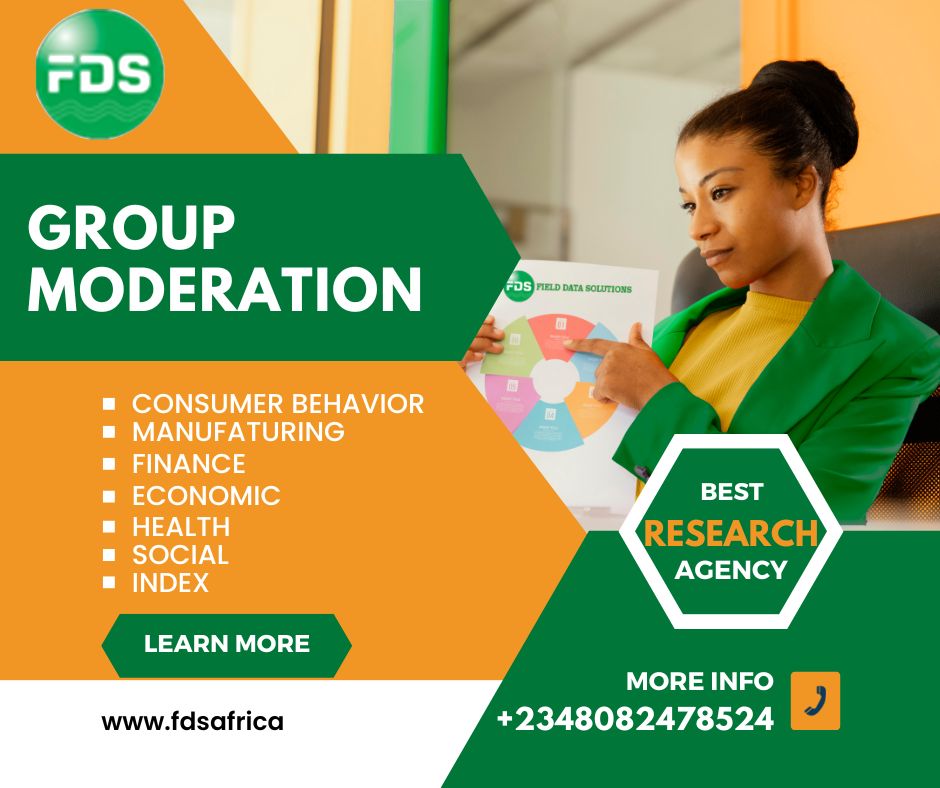
FDS AFRICA SERVICES Group Moderation
Project Summery.
Tips for Effective Moderation in Qualitative Research!
Qualitative research, unlike quantitative research, focuses on exploration and understanding through a qualitative approach. In this type of research, the moderator plays a crucial role in eliciting responses from participants.
The success of a qualitative research project largely depends on the moderator’s ability to possess the right knowledge of the subject, ask relevant and insightful questions, and keep the discussion on track.
The moderator’s capacity to explore consumers in a disciplined manner can reveal valuable insights. Here are some reasons why a trained and skilled moderator is essential in qualitative research:
1. Setting the right expectations:
To ensure the effectiveness of the research, a moderator must be trained to understand the business needs or opportunities that prompted the research. By converting these needs into research objectives, the moderator can establish clear goals for the project.
Understanding the desired end outcome from the client’s perspective is a hallmark of a high-quality moderator. Clear objectives guide the design of the research and help focus on key topics.
2. Planning for an effective study:
Experienced moderators have worked across various categories throughout their careers, accumulating a wealth of knowledge. They are well-versed in a range of research methodologies that can help clients understand their customers better.
Moderators play a central role in developing project techniques, storytelling approaches, homework assignments, and other methods to elicit responses. Their experience enables them to choose the most effective ways to gather the necessary information and gain a deeper understanding of the subject.
3. Maintaining an open mind:
Moderators must avoid introducing personal biases or team biases into the research process. We all have our preferences, and it is crucial for a trained moderator to maintain objectivity. By taking an outsider’s perspective, they can provide an unbiased evaluation of the research design, stimuli, and consumer comments.
An unbiased moderator is invaluable in uncovering the real insights and reasons behind consumer behavior, enabling businesses to make informed decisions based on an accurate interpretation of the truth.
4. Guiding the discussion effectively:
In group moderation/discussions, participants often veer off-topic, which can hinder in-depth exploration of a specific issue. Moderators need to engage participants and ask questions in a way that keeps the discussion focused and avoids confusion.
Even when participants get sidetracked or start discussing unrelated matters, a trained moderator can redirect the conversation back on track. They are skilled at engaging both individual respondents and the entire panel to extract the most valuable insights from the discussion.
5. Avoiding manipulation:
An untrained moderator may unintentionally lead participants to provide certain types of responses, skewing the research findings. Moderator training helps prevent such manipulation, ensuring that the objective remains focused on gaining genuine insights. By maintaining a neutral stance, trained moderators can delve deeper into participants’ thoughts and motivations, leading to more accurate and reliable data.
6. Continuous learning during the study:
As moderators embark on a research project, they begin with a certain level of knowledge about the industry, problem, and research techniques to be applied. However, during the course of the study, they acquire additional knowledge and insights.
A skilled moderator keeps a constant tab on this knowledge evolution, incorporating new learnings into the research process. This ongoing learning ensures that the research remains up-to-date and aligned with the latest industry trends and developments.
In conclusion, the role of a trained moderator in qualitative research cannot be overstated. Their expertise in setting expectations, planning effectively, maintaining objectivity, guiding discussions, preventing manipulation, and continuous learning contributes to the success of the research project. By employing a skilled moderator, businesses can uncover valuable insights that drive informed decision-making and ultimately lead to business growth.

